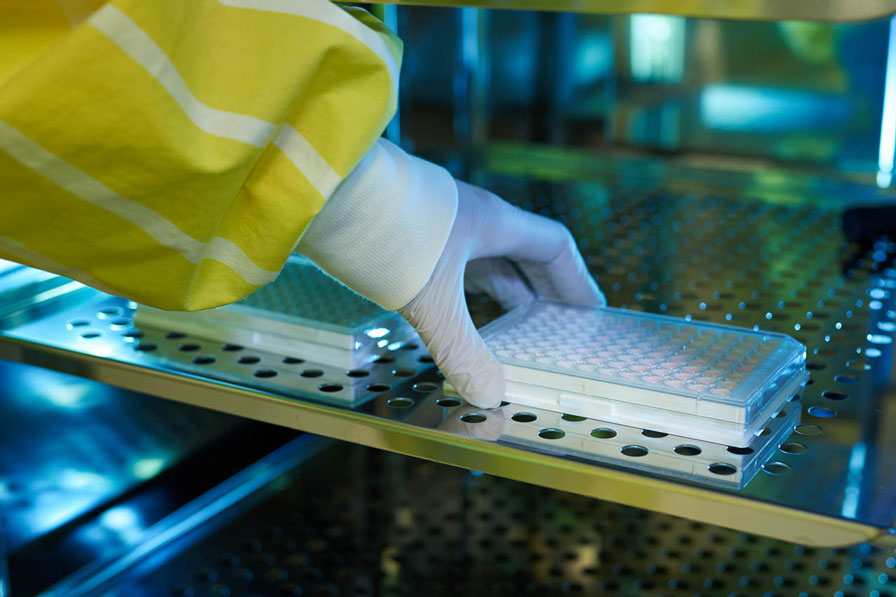iLite® Complement-Dependent Cytotoxicity (CDC) Bioassays
Complement-dependent cytotoxicity (CDC) is an important mechanism of the immune system where harmful cells, such as tumor or virus-infected cells, are destroyed through the activation of the complement system.
Our cell-based solution, built upon our exclusive iLite technology, provides a versatile and assay-ready platform to accurately assess antibody-mediated CDC.
A True Measure of Cell Lysis
In CDC, antibodies bind to surface antigens on the target cell, which recruits and activates the complement system, resulting in cell lysis:
Complement-Dependent Cytotoxicity (CDC). The binding of an antibody to its antigen on the cell surface can attract complement proteins and activate the classical pathway of the complement system, resulting in the lysis of the cell.
As some therapeutic antibodies use CDC as their MoA, screening for this activity has become essential when developing antibody-based drugs. Our iLite® CD20 (+) Svar Luc Assay Ready Cells express CD20, CD38, and CD52 on the cell surface, making them ideal for assessing CDC activity of antibodies binding to these targets.
First, the cells are incubated with the antibody to be tested, followed by the addition of a human serum. If the complement cascade is initiated, the Membrane Attack Complex (MAC) forms, resulting in cell lysis.
Cell lysis triggers the release of luciferase, which is constitutively expressed in the cells. Our CDC bioassays use the brilliant new Svar LUC reporter-gene system, in which the luciferase is located in the nucleus and has improved stability outside the cell.
By adding an appropriate substrate, the amount of luciferase can be quantified. As only luciferase released through cell lysis becomes available to the substrate, the signal specifically corresponds to cell death – making it a true measure of cell lysis.
Principle of the CDC bioassay. Our CDC cell lines express Svar luciferase from a constitutive promoter. In addition, they overexpress antigens on the cell surface that can be bound by a therapeutic drug antibody. Complement proteins from the added human serum can bind to the antibody, triggering lysis of the cell in a process like that of the body. Upon lysis, luciferase leaks out of the cell and can be measured following the addition of a substrate.
Adapted to Your Needs
The flexibility and adaptability of iLite technology means that our CDC bioassays can be easily adapted to include additional surface antigens, including HER2, EGFR, or membrane-bound cytokines such as mTNF or mVEGF.
Adapted to your needs. Our CDC bioassays can be adapted to overexpress many different markers.
In an Assay-Ready Format
Our CDC bioassay cells come in an assay-ready format, eliminating the need for time-consuming cell culture procedures, and saving both time and money. You can start the experiments immediately without the hassle of cell thawing, counting, or passaging. This streamlined process improves efficiency and accelerates data generation.
Reproducibility and Safety
Our CDC bioassays ensure consistency and reproducibility, providing quantitative results that enable accurate measurement and comparison of CDC response across samples. This quantitative data empowers informed decision-making and optimization of therapeutic antibody candidates.
As an added benefit of the assays, the non-radioactive platform ensures the safety of lab personnel and the environment.

Use in Complement Targeting Therapeutics
In addition to their use in assessing a wide range of drug candidates, our CDC bioassays are well-suited for specifically assessing complement targeting therapeutics. By measuring cell lysis induced by complement activation, these assays provide valuable information about the efficacy and potency of complement-targeting therapeutics.
Application Areas for CDC Bioassays
CDC assessment has become important for the development of therapeutic antibodies used in the treatment of various diseases, including cancers and autoimmune disorders. It can be used to assess CDC activity for antibody drug candidates, but it can also be used in the quantification of CDC inhibitors.
However, CDC assessment is also used in other areas, such as immunotherapy research, quality control, and immunological research.
Overall, CDC assays are versatile tools in biomedical research, drug development, and clinical practice, aiding in evaluating antibody cytotoxicity and advancing treatments for a wide range of diseases. In addition, they offer valuable insight into the MoA of therapeutic antibody candidates and should be used in combination with other Fc-mediated cytotoxicity assays, such as ADCC and ADCP bioassays.